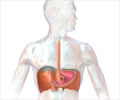A new study suggests that the commonly used heartburn drugs belonging to proton pump inhibitors increase heart attack risk. Could this really be true? Read on to find out more.
Heartburn or gastroesophageal reflux disease (GERD), which is caused due to reflux of acidity from the stomach into the lower esophagus or food pipe, causes symptoms of stinging sensation in the chest, burning sensation in the throat, and difficulty swallowing. Symptoms typically appear on eating spicy foods or lying down soon after a heavy meal.The proton pump inhibitor group of drugs, which includes the drugs omeprazole, lansoprazole, esomeprazole, rabeprazole and pantoprazole are commonly used to treat heartburn. Drugs from another group called the H2 blockers like ranitidine, famotidine etc. are also commonly used to treat acidity.
A recent study published in PLoS ONE indicates that these medications may increase the risk of heart attack. The researchers of the study analyzed data from medical records of 2.9 million individuals using data-mining. The data-mining procedure allows analysis on a large quantities of data.
On analysis of the data, the researchers found that there was an increase in the risk of heart attack in those who took proton pump inhibitors, but not those who took H2 blockers. The authors suggest that proton pump inhibitors may cause changes at the molecular level of blood vessels. Previous research has indicated that proton pump inhibitors may reduce the production of nitric oxide by the inner lining of the blood vessels. Nitric oxide plays an important role in maintaining blood circulation.
However, this does not mean that you press the panic button and stop using the proton pump inhibitor that you have been taking all this while. The study could not assess for sure whether the medication was directly responsible for the increased risk. They also could not evaluate if the patients taking the proton pump inhibitors were already at a high risk for heart attack before taking the medication. A clinical trial to address the issue will need to be designed and carried out before any recommendation to avoid using proton pump inhibitor can be made.
Earlier studies have indicated that proton pump inhibitors reduce the effect of clopidogrel, an antiplatelet drug when used to reduce heart attack in patients with history of acute coronary syndrome. Thus, patients on clopidogrel should use proton pump inhibitors with caution. But whether this caution should extend to all individuals irrespective of whether they are at a risk of heart disease or not can be addressed only after further studies.
The importance of lifestyle changes in like stopping smoking, reducing alcohol intake, eating less spicy foods, losing weight and sleeping with the head slightly raised in preventing heartburn should not be underestimated.














